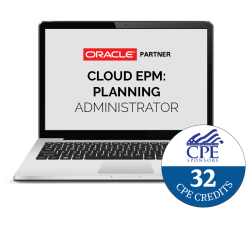How Can I Take this Course?
Keyteach provides flexible training options to suit your needs. Choose from globally scheduled instructor-led courses, private team classes, or our self-paced 'On Demand' training. The 'On Demand' option features a live hands-on lab for in-depth workshops and unlimited instructor support.
Upcoming global instructor-led scheduled training classes
 Oracle Cloud EPM: Planning (E/PBCS) Administrator (5 days)
Oracle Cloud EPM: Planning (E/PBCS) Administrator (5 days) 24-Feb-2025 9:00 am
LIVE ONLINE Instructor-Led Training (USA ET Eastern time)
Price: $4,800 USD
 Oracle Cloud EPM: Planning (E/PBCS) Administrator (5 days)
Oracle Cloud EPM: Planning (E/PBCS) Administrator (5 days) 19-May-2025 9:00 am
LIVE ONLINE Instructor-Led Training (USA ET Eastern time)
Price: $4,800 USD
 Oracle Cloud EPM: Planning (E/PBCS) Administrator (5 days)
Oracle Cloud EPM: Planning (E/PBCS) Administrator (5 days) 19-May-2025 9:00 am
LIVE ONLINE Instructor-Led Training (UK/London time)
Price: £3,850 GBP
Would you like to arrange a private class for your team?
Keyteach provides the flexibility to deliver this instructor-led course on dates that suit your team’s schedule. Private classes, conducted live online with a remote instructor, require a minimum of two participants. Alternatively, we can arrange in-person training at your location upon request.
- Oracle Cloud EPM: Planning (E/PBCS) Administrator Private Instructor-Led Training for Your Team $4,800.00 per person (min 2 attendees)


INSTANT ACCESS
- An immediate 'On Demand' subscription for you
- Instant access - start training today!
- 90 day course subscription
- Hands-on lab access for 28 days
- Unlimited instructor support
- Train anywhere, anytime at your convenience


PRE-PAID VOUCHERS
- 'On Demand' vouchers for you or your team to redeem later
- Voucher codes valid for 12 months
- 90 day course subscription
- Hands-on lab access for 28 days
- Unlimited instructor support
- Train anywhere, anytime at your convenience
Course Summary
Learn how to design and build Oracle Cloud EPM Planning applications. Create planning models and gain an in-depth understanding of how to make efficient use of the capabilities and extensibility of this planning and budgeting solution. Learn how to leverage the potential of this system to build more effective applications and workflows.
Audience
- System Administrators
- Implementation Consultants
Duration
- Instructor-led training: 5 days (35 CPE Credits)
- Self-paced on demand training: 90 days (32 CPE Credits)
Course Description
This course focuses on the options, functionality, and design considerations of Planning Cloud applications. During this training course you'll learn how to apply best practice techniques during the development process. Attendees will learn about the multi-dimensional hierarchies and gain an appreciation of the complexities and possibilities of this solution. You will find out what can be achieved through a detailed exploration of the underlying structure of the Oracle Planning Cloud solution. Learners will discover how to build data forms, load data, explore detailed calculations and gain an understanding of the planning cycle. Attendees will also gain an appreciation of the ways in which plan data can be adjusted, translated into different currencies and aggregated within Oracle Planning Cloud.
This course will equip attendees with the necessary tools and knowledge to design and build effective, responsive and highly optimised applications.
Learning Objectives
By the end of this course learners will be able to:
- Explain how the Oracle Cloud EPM Planning database functions and how it can be maintained to enable efficient applications
- Identify how Cloud EPM applications can be backed-up and migrated from test to production or to another Oracle Planning Cloud instance
- Recognize how Business Rules support the financial planning process
- Summarize the difference between BSO and ASO and how Data Maps can be used to transfer data between plan types
- Recall how to build data/web forms, Dashboards and Infolets
- Differentiate between the web interface and Smart View and how each can be used to update metadata
Course Agenda
Day 1
- Solution Overview
- Overview of PBCS Functionality
- Navigation of the Interfaces
- Review Key Terms and Concepts
- Review the key PBCS terms relating to dimensions, members, and the wider application.
- Explore the concepts that are key to the planning process in PBCS to gain a "big picture" understanding.
- Loading Metadata
- Introducing Data Integration (Data Management)
- Other Data Entry Methods
Day 2
- Adjusting Forecasts
- A variety of adjustment techniques are available when working with E/PBCS, allowing you to amend individual values or adjust whole data ranges as required.
- Comparing Budget Versions
- PBCS allows for multiple versions of your budgets and forecasts to be prepared.
- Discuss how this functionality can be leveraged to provide an iterative planning process.
- Rolling Forecasts
- The Approvals Process
- Lifecycle (Application) Management
- Discover how to move artefacts between development and production applications.
- Find out how to back up an application.
- Basic Calculation and Member Formulas
Day 3
- Managing Exchange Rates
- Understanding Security
- Control access to an application and its components.
- Overview of Reporting Studio
- Understand more about running reports.
- Get an overview of Report Designer
- An additional two-day course is available for learners that require more extensive knowledge
- Smart View
- Ad Hoc Analysis
- Discover the benefits of using Ad Hoc Analysis functionality to create queries and analyse data from PBCS.
- Smart View Across Microsoft Office
- Understand how Smart View can be used across the suite of Microsoft Office products such as Word, PowerPoint, and Outlook.
- Ad Hoc Analysis
- Review of Architecture
- My Services
- Application and Plan Types
- Planning Cloud Dimensionality
- Creating Applications
- Explore the variety of options and design decisions available when creating new Planning Cloud applications.
Day 4
- Designing Data Forms & Task Lists
- Task lists guide users through the planning process.
- Data forms provide a window to the database for the review and manipulation of data.
- Building Custom Menus
- Learn how to enhance navigation within Planning Cloud through the development of custom menus.
- Enable users to more easily access custom content.
- Application Diagnostics
- Data Auditing
- An Introduction to the Setup of Source Data Integration with Data Management
- An additional two-day course is available for learners that require more extensive knowledge.
- Designing an Approvals Process
- Undertake a simple approvals process to review various available options for the promotion, delegation, and sign-off of planning data.
- Discover how to set up a Planning Unit hierarchy and perform the required Scenario and Version assignment.
Day 5
- Introducing Calculation Manager
- Understand how to work with Calculation Manager to design, maintain, and deploy business rules for a Planning Cloud application.
- An additional two-day course is available for those that need more advanced calculations.
- Substitution Variables
- Add flexibility through the use of dynamic substitution variables for use in data forms and business rules.
- Top-Down Allocations and Bottom-Up Strategies
- Translation and Aggregation
- Automate the translation of data to the available reporting currencies when working with multi-currency applications.
- Driver-Based Planning
- Customisable calculations allow you to embed a driver-based approach in your planning process.
- Understanding EPM Automate
- Discover how the EPM Automate utility can help to streamline and automate common tasks.
- Tasks include loading data and managing the Cloud environment.
National Association of State Boards of Accountancy (NASBA)

- Course title: Oracle Cloud EPM: Planning (E/PBCS) Administrator
- Duration: 5 days
- Audience: System Administrators | Developers | Implementation Consultants
- Pre-requisites: None
- Delivery method: Group Live, Group Internet-Based and QAS Self-Study
- Advanced preparation: None
- Recommended CPE credits:
Group Live and Group Internet-Based: 35 credits - computer software and applications
QAS Self-Study: 32 credits - computer software and applications - Programme level: Intermediate
Keyteach is registered with the National Association of State Boards of Accountancy (NASBA) as a sponsor of continuing professional education on the National Registry of CPE Sponsors. Registration ID No 115820. State boards of accountancy have the final authority on the acceptance of individual courses for CPE credit. Any complaints regarding registered sponsors may be submitted to the National Registry of CPE Sponsors through its website: www.learningmarket.org
Oracle's Planning Cloud (E/PBCS) enables businesses of all sizes to quickly adopt world-class planning and budgeting applications without any infrastructure investments.
E/PBCS is a powerful tool that's rarely fully exploited without professional training. Associated products, such as Data Integration and Financial Reporting Web Studio, means that training is essential to unlock the potential of PBCS and support its successful development and deployment.
Keyteach has a variety of different training courses for Oracle Planning Cloud (E/PBCS) and these are based on the role you will be undertaking. There is a one-day Smart View training course as well as a more extensive two-day key user training course for more advanced users. We have a project team enablement course for project managers and design teams that need to get up to speed fast as well as a two-day course for those that need to design Oracle Financial Reports.
System administrators and implementation consultants who will create and/or manage applications should attend the full five-day administrator training course. They will learn how to design and build PBCS applications, develop planning and budgeting models and load and manipulate data and metadata in PBCS applications. They will also gain an in-depth understanding of how to make efficient use of the capabilities and extensibility of PBCS and learn how to leverage the potential of this powerful solution in order to build more effective applications and workflows.
Keyteach has a variety of ‘On Demand’ training courses for Oracle Planning Cloud (E/PBCS) that can be undertaken at home. These training courses are designed for system administrators and include a live hands-on lab environment to undertake in-depth workshops. You can start the training straight away and there is unlimited instructor support. These courses are self-paced and can be purchased as a 90 day subscription:
Find out more about our range of self-paced 'On Demand' training courses for system administrators and implementation consultants to learn at home by clicking here.